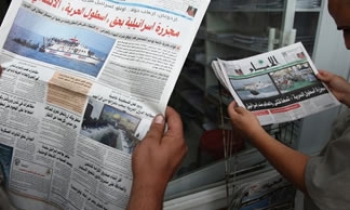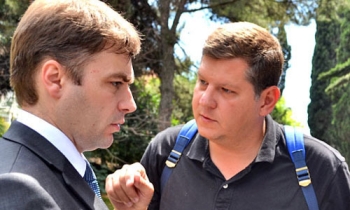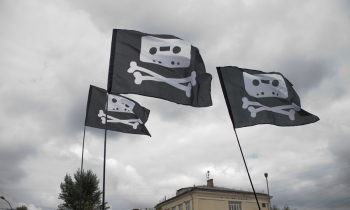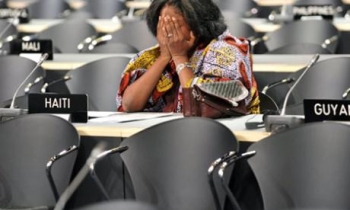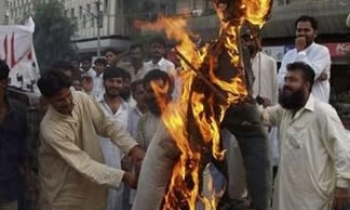Taliban militiamen have beheaded Afghan journalist Ajmal Naqshbandi who had been held capitive since March 4, news reports have said. The death of Naqshbandi came on a day of heavy violence in Afghanistan that also saw the deaths of seven North Atlantic Treaty Organization (NATO) soldiers in roadside bombings in the south.
A government official confirmed Naqshbandi’s slaying hours after a purported Taliban spokesman telephoned news agencies in capital Kabul to say that the journalist had been beheaded, acording to an Associated Press (AP) report.

Naqshbandi was working with Daniele Mastrogiacomo, reporter of Italian daily La Repubblica, in the troubled southern province of Helmand, where the Taliban insurgency is strongest, when the two men and their driver Sayed Agha were kidnapped March 4.
The driver was beheaded soon afterwards. Mastrogiacomo was released March 19 after Afghan President Hamid Karzai agreed to free five Taliban prisoners, including at least two senior members of the fundamentalist Islamic movement. The swap provoked strong protest from critics who said the deal would encourage more abductions.
Within the last two weeks, at least 13 Afghans and two French aid workers have been kidnapped. Taliban rebels have demanded further releases of their jailed associates in exchange for some of the hostages. Naqshbandi’s captors had offered a similar swap for him, but Karzai on Friday ruled out any more deals.
“When we demanded the exchange for the Italian journalist, the government released the prisoners, but for the Afghan journalist, the government did not care,” Shahabuddin Atal, a purported Taliban spokesman, told the Associated Press. Atal said that his group beheaded Naqshbandi in the Garmsir district of Helmand province Sunday afternoon.
Karzai said he agreed to a swap for Mastrogiacomo out of gratitude for Italy’s commitment of 1,800 troops in Afghanistan and because Italian Prime Minister Romano Prodi had called him “several times and asked for cooperation.”
Reporters sans Frontières (RSF) expressed “deep shock” at Naqshbandi’s murder. “We are distressed and revolted by this cowardly murder and we feel strongly for his family and friends at this time. He was also the victim of double standards because the campaign for his release was not strong enough. Ways must be found to protect local people who work with foreign journalists or else these media assistants will not be able to work at all.”
“The inhumanity and unspeakable brutality of this group cannot be overstated,” said Aidan White, International Federation of Journalists (IFJ) General Secretary. “If deals are done which free foreigners, while locals are butchered it puts a price on the head of any media person from abroad working in Afghanistan. The cynical and sickening brutality of the killing of Sayed Agha and now Ajmal Naqshbandi emphasise more than ever our message that Afghanistan is becoming a no-go area for media staff and particularly for foreign news teams.”

News of Naqshbandi’s killing came as a heavy blow to colleagues and some Afghan officials who had thought some kind of a deal to secure his release might be possible. Last week, journalists rallied in Kabul to press the government to work harder to win their colleague’s freedom.
In Rome, where a huge photograph of Naqshbandi has been hanging from the facade of City Hall as a way to press for his release, Mastrogiacomo said he was devastated by the news of his colleague’s death.
“This homicide was horrible, gratuitous and cowardly,” Mastrogiacomo said in a statement. “Ajmal was a journalist, like me, like so many who practice our craft circulating through the world.” The blame for the killing rests squarely with the Taliban, “who have shown their true face to the world,” he said. “They are simple murderers.”
“Martyring Ajmal Naqshbandi and their other crimes happen as the government shows extreme leniency towards the Taliban prisoners,” Arman-e-Millie daily said in an editorial. “There has been no implementation of punishment for any criminal and killer Taliban who has been sentenced to heavy punishment by the judicial authorities,” it said. “From now on, criminal Taliban should be executed.”
The UN envoy to Afghanistan, Tom Koenigs, condemned the killing, and called for action to apprehend the perpetrators. “I condemn this senseless murder unreservedly and call on the authorities to bring those responsible to justice,” Koenigs said in a statement in Kabul, the text of which was also released at UN Headquarters in New York.
“The perpetrators of this crime have shown absolute indifference to the value of human life by ignoring the calls of family, journalists and Afghans who with one voice called for his safe return,” added the envoy, paying tribute to the slain reporter for “playing a vital role in highlighting the concerns and challenges of the Afghan people as well as a firm resolve to see justice done.”


